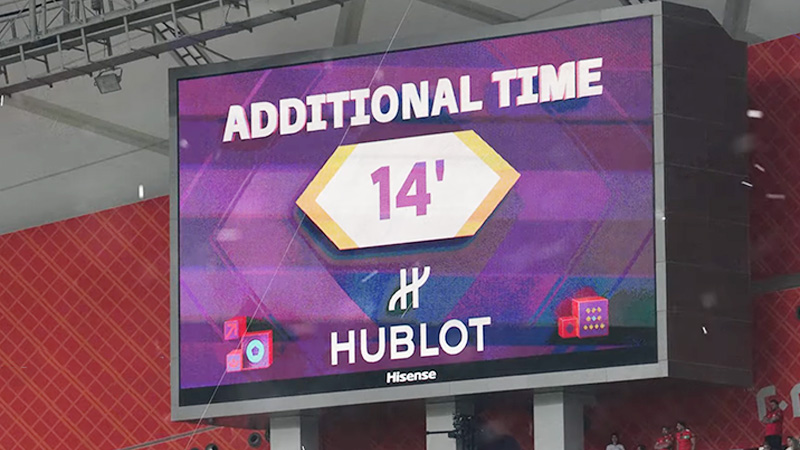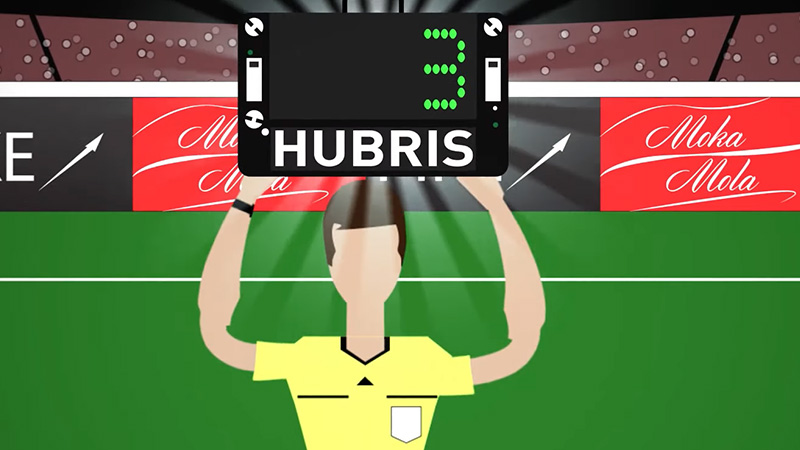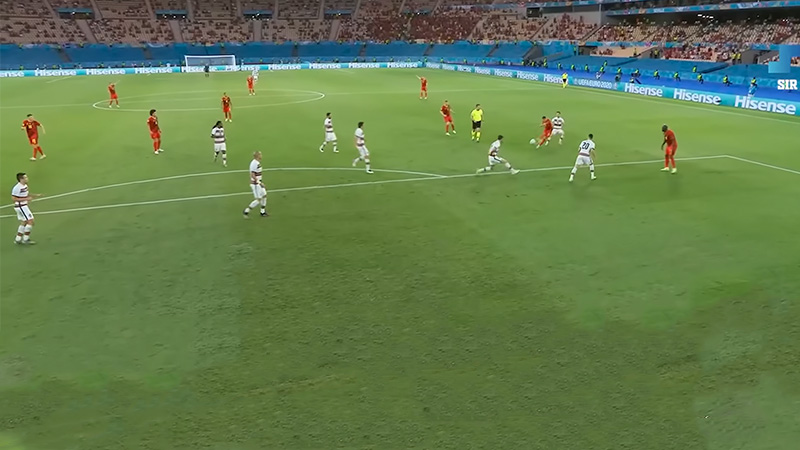Soccer, the world’s most popular sport, captivates millions of fans with its fast-paced action, skillful maneuvers, and nail-biting moments.
As spectators cheer on their favorite teams, a common question arises: How long is a soccer game?
While the answer may seem straightforward, the intricacies of soccer’s timekeeping system can be perplexing to newcomers and even seasoned enthusiasts. In this article, we delve into the duration of a soccer game, shedding light on the various factors that influence its length.
From the regulation time on the clock to stoppages, injury time, and potential extensions, we explore the nuances that shape the overall duration of this beloved sport.
So, join us as we unravel the mysteries behind the length of a soccer game and gain a deeper understanding of the timekeeping intricacies that make each match a thrilling spectacle.
How Long Is A Soccer Game?
A standard soccer game typically lasts for 90 minutes of regulation time, divided into two halves of 45 minutes each. However, it’s important to note that the actual duration of a soccer game can vary due to various factors.
These factors include stoppages for injuries, substitutions, and time-wasting tactics employed by teams. The referee also adds additional time, known as injury time or stoppage time, at the end of each half to compensate for any time lost due to stoppages.
Injury time is determined based on the referee’s discretion and can vary from a few seconds to several minutes.
In addition, in knockout competitions or tied matches, extra time and penalty shootouts may be required to determine a winner, further extending the duration of the game. Therefore, while the standard duration is 90 minutes, the actual length of a soccer game can be longer due to these factors.
How Long Is Stoppage Time?

Stoppage time, also known as injury time or added time, is the additional time added by the referee at the end of each half of a soccer game. It is meant to compensate for any time lost due to stoppages, such as injuries, substitutions, time-wasting tactics, or other interruptions during the match.
The duration of stoppage time is determined by the referee’s discretion and can vary from game to game. The referee considers factors such as the number and length of stoppages that occurred during the half, as well as any other significant events that may have caused delays.
Typically, the referee will indicate the amount of stoppage time to be added by holding up a board or displaying the number on an electronic display.
The added time is usually expressed in minutes, and it is important to note that the indicated time is a minimum, meaning that the referee can add more time if necessary.
The length of stoppage time can range from a few seconds to several minutes, depending on the circumstances of the match.
It is important for players and teams to manage this additional time effectively, as it can provide opportunities to score goals or make strategic changes.
It is worth mentioning that the concept of stoppage time is intended to ensure fairness and compensate for any time lost during the game. While it may extend the overall duration of a soccer match, it is an essential component in maintaining the integrity of the game and allowing for a fair and complete contest.
How Long Is a Soccer Game with Extra Time?

A soccer game with extra time refers to a match that has not been decided within the standard 90 minutes of regulation time. Extra time is played to determine a winner in knockout competitions or tied matches, such as in tournament knockout stages or cup competitions.
The duration of extra time can vary depending on the competition and the specific rules in place. Generally, extra time consists of two halves, each lasting 15 minutes. These halves are played immediately after the completion of the regulation time, without any break or halftime interval.
During extra time, teams have the opportunity to score goals and secure a victory. If a team scores during extra time, they are immediately declared the winner, and the match ends. However, if the score remains tied at the end of extra time, the game may proceed to a penalty shootout to determine the winner.
In a penalty shootout, each team takes turns attempting penalty kicks from a designated spot on the field. The number of penalty kicks per team can vary, but it typically follows a predetermined format, such as a best-of-five or best-of-three shootout. The team that scores more penalties at the end of the shootout is declared the winner.
It is important to note that the duration of extra time and the rules for determining a winner may vary depending on the competition or tournament regulations.
Some competitions may have different formats, such as a golden goal rule, where the first team to score during extra time wins the match instantly, or a silver goal rule, where the team leading at the halfway point of extra time is declared the winner.
In summary, a soccer game with extra time can extend the duration of the match beyond the standard 90 minutes of regulation time. Extra time typically consists of two 15-minute halves, and if a winner is not determined during this period, the game may proceed to a penalty shootout.
The specific rules and duration of extra time may vary depending on the competition or tournament regulations in place.
What Causes Soccer Games to Last Over 90 Minutes?

Soccer games can last over 90 minutes due to various factors that can extend the duration of the match. Here are some common reasons:
Stoppage Time
Stoppage time, also known as injury time or added time, is added by the referee at the end of each half to compensate for time lost due to stoppages. These stoppages can include injuries, substitutions, time-wasting tactics, or other interruptions during the game.
The referee determines the amount of stoppage time based on their discretion, and this additional time is added to the 90 minutes of regulation time.
VAR (Video Assistant Referee) Reviews
The introduction of VAR in many soccer leagues has led to additional time being added to matches. VAR is used to review and make decisions on certain incidents, such as goals, penalties, or red card offenses. The time taken for VAR reviews can vary, and it is added to the overall duration of the game.
Extra Time
In knockout competitions or tied matches, extra time may be played to determine a winner. Extra time typically consists of two halves of 15 minutes each, and it is played immediately after the completion of the regulation time.
If a winner is not determined during extra time, the game may proceed to a penalty shootout, further extending the duration.
Delays and Time-wasting Tactics
Players and teams sometimes employ time-wasting tactics, such as deliberately taking longer for throw-ins, goal kicks, or substitutions, to run down the clock. These tactics can lead to additional time being added by the referee to compensate for the time lost.
Other Factors
Weather conditions, pitch maintenance, and unforeseen events like crowd disturbances or medical emergencies can also cause delays and extend the duration of a soccer game.
Note that while the standard duration of a soccer game is 90 minutes, the actual length can vary due to these factors. The unpredictability and dynamic nature of the sport contribute to the varying durations, making each match unique and exciting for players and fans alike.
How Long Is a Soccer Game with a Penalty Shootout?
A soccer game with a penalty shootout can extend the overall duration of the match beyond the standard 90 minutes of regulation time.
The duration of a penalty shootout itself can vary depending on the number of penalties taken and the specific rules in place. Here’s a breakdown of how long a soccer game with a penalty shootout can last:
Regulation Time
A standard soccer game consists of two halves of 45 minutes each, totaling 90 minutes of regulation time. However, if the score remains tied at the end of regulation time, the game proceeds to extra time.
Extra Time
Extra time is played to determine a winner in knockout competitions or tied matches. It typically consists of two halves of 15 minutes each, totaling 30 minutes.
If a team scores during extra time, they are immediately declared the winner, and the match ends. However, if the score remains tied at the end of extra time, the game proceeds to a penalty shootout.
Penalty Shootout
In a penalty shootout, each team takes turns attempting penalty kicks from a designated spot on the field. The number of penalty kicks per team can vary, but it typically follows a predetermined format, such as a best-of-five or best-of-three shootout.
If the score remains tied after the designated number of penalties, the shootout may continue to sudden death, where teams take alternating penalties until a winner is determined.
The duration of a penalty shootout itself can vary depending on factors such as the number of penalties taken, the time taken for each penalty, and potential delays between penalties.
On average, a penalty shootout can take around 10 to 15 minutes to complete, but it can be shorter or longer depending on the circumstances.
FAQs
Are there any breaks or halftime during a soccer game?
No, there is typically no official break or halftime during a soccer game. The game is played continuously for two halves of 45 minutes each, with a brief interval between the halves for teams to switch sides.
Can a soccer game end in a tie?
Yes, a soccer game can end in a tie if the score remains level at the end of regulation time and any additional extra time played. In some competitions, such as league matches, a draw is a common outcome.
Can a soccer game be shorter than 90 minutes?
Yes, a soccer game can be shorter than 90 minutes if it is abandoned or terminated due to various reasons, such as severe weather conditions, crowd disturbances, or other unforeseen circumstances. In such cases, the match may be rescheduled or declared void, depending on the competition’s rules.
Can a soccer game go on for more than 90 minutes without extra time?
In general, a soccer game should not go on for more than 90 minutes of regulation time without additional extra time. However, in rare cases where there are significant delays or stoppages, the referee may add additional time to compensate for the lost minutes.
How long is the halftime interval in a soccer game?
The halftime interval in a soccer game typically lasts for around 15 minutes. During this time, players have the opportunity to rest, receive instructions from their coaches, and make any necessary adjustments for the second half of the match.
Final Words
So, now you know how long is a soccer game. The duration of a soccer game is influenced by various factors that go beyond the standard 90 minutes of regulation time.
From stoppages for injuries, substitutions, and time-wasting tactics to additional minutes added by the referee for stoppages during each half, the actual playing time can vary.
Moreover, in knockout competitions or tied matches, extra time and penalty shootouts may be required to determine a winner, further extending the duration.
It is important to note that the precise length of a soccer game can be unpredictable, as it depends on the flow of play and unforeseen circumstances.
So, the next time you find yourself wondering how long a soccer game lasts, remember that it’s not just about the clock, but the unpredictable twists and turns that make each match a unique and unforgettable experience.







